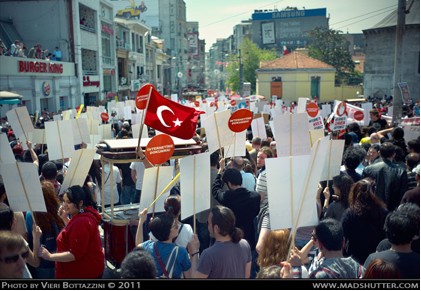After Crackdown, Turkish Chant ‘Don’t Touch My Internet!’
by Madeleine Barnes / May 26, 2011 / No comments
More than 10,000 people gathered in cities around Turkey on May 15 to protest the government’s new Internet censorship legislation, which will require citizens to install filters on their computers if they want to access the Internet.
At Taksim Square in Instanbul, one of 31 sites for demonstrations against online censorship, protestors dragged symbolic keyboards and hoisted signs reading “Let Me Surf” and “Don’t Touch My Internet!”
Since then, several websites that backed these demonstrations have been intermittently inaccessible because of Distributed Denial of Service attacks. The targets include the site of the left-wing daily Birgün, the news site haber.sol.org.tr and the media freedom website Bianet.
Opponents to the law believe the filters are akin to wiretapping and allow Turkey’s Internet regulator to determine what content users may access and to expand its list of prohibited websites.
On the other hand, Turkish authorities claim the legislation is strictly intended to protect children and minors from pornographic material.
In recent years, the Turkish government has imposed similar legislative measures that threaten online freedom of expression by allowing authorities to monitor and limit internet activities.
Last year, Turkish High Council for Telecommunications (TIB) forced Internet service providers to block new Youtube content, as well as to freeze access to several Google services. And last month, the TIB issued a list of 138 keywords that Internet Service Providers must ban from Turkish Internet—a mandate that would allow Turkish authorities to censor and suppress certain websites because of a few prohibited words.
While that measure was abandoned, the TIB already blocks thousands of websites with sensitive content, especially those that reference Mustafa Kemal Atatürk (the nation’s founder), the Kurdish minority, armed forces, and organizations deemed “terrorists.”
Read more about Turkey’s censorship efforts at Reporters Without Borders.
In March, Reporters Without Borders released a 100-page report on the state of online freedom of expression in the 10 countries it has identified as “Enemies of the Internet” and the 16 countries it is keeping “under surveillance” because of their questionable Internet policies. Turkey is currently “under surveillance.” Read the report here.






